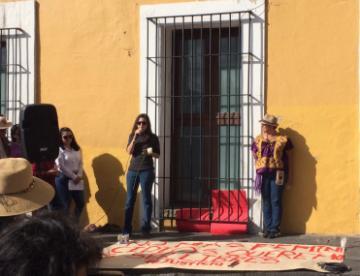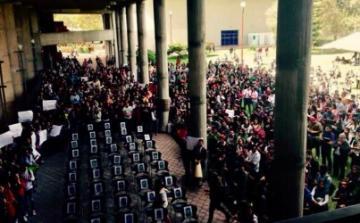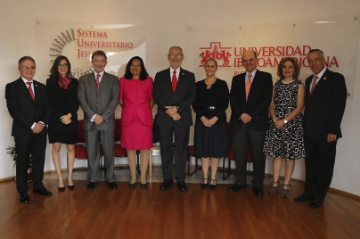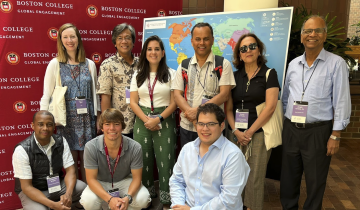My Ignatian Journey in the Advancement of Justice
Rooted in the Ignatian Examen, I reflect on 22 years of Ignatian formation that have shaped my journey to becoming the Director of Mission Engagement at Santa Clara University. As I look back, three recurring themes emerge from my experience in the Jesuit Catholic tradition.
1. Education Grounded in Faith, Justice, and Academic Excellence
My journey began in sixth grade at a Jesuit school in Puebla, Mexico. I was introduced to the harsh realities beyond the classroom. Every year, we visited communities experiencing poverty and marginalization. We listened to people’s stories, worked alongside them, and learned firsthand about their struggles. One experience took me to el campo, where I worked with families harvesting nopales (prickly pear cactus). We labored under the hot sun, cutting thorns from the cactus, and sold 100 pieces for less than two dollars to an intermediary who would sell them at a much higher price to the grocery store where my mother would buy the groceries for our home; everything was connected, but as a 14-year-old teenager, I couldn't fully comprehend the systemic injustices. Still, I could feel the unfairness in my bones and my heart.

Protesting against feminicides in Puebla, Mexico
Six years later, I enrolled in the communications undergraduate program at Universidad Iberoamericana Puebla, the Jesuit University in Puebla, Mexico, where I attained valuable professional skills. Yet, my education was also marked by encounters with suffering; I must say, my heart was broken by the scenes I would encounter. Alongside my professor and classmates, I protested for a less violent and unjust country. We joined the cries and the pain of the mothers of disappeared people due to violence in Mexico as we accompanied them. We visited migrant shelters where La Bestia would pass through; we would see the hope in the eyes of these men and women to get to the US. We reminded them of the children they left behind; they cried, and we cried with them. We accompanied indigenous communities in their fight for freedom and autonomy. In this way, my professors instilled in me the belief that education's true purpose is to foster a commitment to advancing justice in the world.
Simultaneously, my spirituality was deepened over these two decades through Ignatian retreats, the 19th Annotation of the Spiritual Exercises of St. Ignatius of Loyola, and weekly gatherings with my "Comunidad Universitaria de Vida Ignaciana" (University Community of Ignatian Life). This community provided a space to explore faith, share our doubts and questions, and support one another through challenging and joyful moments. It was a dimension truly needed to endure the harsh realities we encountered during our formative years.
2. Prophetic Leadership for the Common Good
As a student, I noticed that not only did my professors share the commitment to defending human dignity but also the President of my university, Fernando Fernández Font, S.J. His voice served as a moral compass for society in Puebla, consistently denouncing the corruption and negligence of the government and other powerful institutions. He was crystal clear in his belief that the role of our university was not just to study societal problems but to promote truth and justice through public advocacy.

Ibero Puebla student protest in solidarity with the 43 students from Ayotzinapa
By this time, I had already started publishing in regional newspapers and working in communications. Ibero Puebla hired me to help promote the university on local radio and TV. One day, I received a call from Human Resources inviting me to apply for the role of Executive Secretary to the President. Little did I know all my previous Jesuit education experiences had led me toward this pivotal moment.

Board of Universidad Iberoamericana Puebla, in the middle President Fernando Fernández Font, S.J.
In this new role, one of my key responsibilities was to serve as Fr. Fernández’s ghostwriter. At just 24 years old, I needed to understand who this 67-year-old Jesuit priest was to capture his voice and vision. To do so, I immersed myself in the leaders he admired—Pedro Arrupe, S.J., Ignacio Ellacuría, S.J., Peter-Hans Kolvenbach, S.J., St. Oscar Romero, and, of course, St. Ignatius of Loyola. We would meet every morning at 8 am to discuss local, national, and international news, and he would often pull out a small piece of paper from his pocket containing the Gospel of the day. He’d highlight a phrase, ask for my thoughts, and then share his reflections. These daily conversations formed me in a faith that is always connected to justice, engaging deeply with the world's economic, political, and social realities. I was getting more clarity about what this Jesuit Education meant and my role as a Jesuit alumnus and a new collaborator.
3. The Global Dimension of Jesuit Education
When I began working in the president's office, Fernando was also the president of the Association of Jesuit Universities in Latin America, AUSJAL. This deepened my understanding of the worldwide impact of Jesuit education. It was inspiring to witness how Jesuit institutions across the continent collaborated in their shared mission of a faith that does justice. This sparked a new imagination of how to be more effective in our research, advocacy, and solidarity.

IAJU Communications Team 2022, including Fr. Joseph Christie, S.J., Secretary of Jesuit Higher Education
Throughout this time, I saw the emergence of a new global network—the International Association of Jesuit Universities (IAJU). This new initiative brought Jesuit universities from all over the world together to respond collectively to the pressing challenges of society and education. This paradigm of working as a global network to advance our shared Jesuit mission became an exciting idea for me, one that would shape my vision of what Jesuit institutions could aim for collectively. In 2019, I felt deeply invited to expand my horizons and pursue graduate studies at a Jesuit university outside of Mexico. I enrolled at the University of San Francisco (USF), where I earned my master’s degree in International Studies and later pursued a Doctorate in Catholic Educational Leadership. During these years, I volunteered with the IAJU Communications Team, supporting initiatives like the Celebration of the Ignatian Year, the IAJU Assembly in Boston in 2022, and the call for Best Practices in Jesuit Higher Education. These experiences shaped my understanding of Jesuit collaboration beyond borders and showed me the profound impact of collaborating as a global community of educators.
This ongoing journey centered on faith, justice, education, and the Jesuit global community suddenly took an unexpected turn. I was invited to be the Secretary of the Commission on the Role and Responsibilities of Women in the Society of Jesus (Women’s Commission), a new body formed by the Father General of the Society of Jesus. As a woman collaborating in Jesuit educational universities, I have encountered profound challenges in a global society that restrains the advancement of justice and equity, particularly concerning gender, race, age, culture, and traditions. For many years, I have supported movements for women's liberation, and here, I was faced with a huge opportunity. I was speechless but also felt the responsibility on my shoulders and the fear of participating in such a delicate topic, not knowing what the outcomes could be.

Father General Arturo Sosa, S.J., celebrating mass with the Commission on the Role and Responsibilities of Women in the Society of Jesus, and members of the Institute of Philippine Culture (IPC) from Global Jesuit website
From my perspective, the diverse and profound ways we experience Jesuit education and mission are both our greatest strength and our most significant challenge. As a Jesuit university, we must approach this with the utmost seriousness and commitment. It is this very richness—this capacity to engage deeply with faith, justice, and global collaboration—that requires us to continually push beyond our own interests and prioritize the Common Good in every action.
With this in mind, I am eager to contribute my experiences and formation to an educational project that embodies this mission. The three threads I have shared in this article will guide my leadership and programming as the Director of Mission Engagement at the Ignatian Center, always guided by our SCU Mission and Strategic Plan to build a more humane, just, and sustainable world for all.
